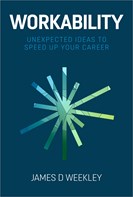- Behaviour
Workability
A highly original guide to thriving at work and navigating a corporate career
This is the opening message of James D. Weekley’s, admirably concise, new book, Workability: Unexpected Ideas to Speed Up Your Career. In essence this compilation of savvy workplace wisdom is a playbook for surviving and thriving in the corporate world—a guide we will wish we had read at the start of our careers before encountering the many pitfalls he describes.
A cknowledging the views of others doesn’t start at leadership. In fact, leadership is an over-hyped concept says Weekley, a pioneer in employee communication and engagement. It starts with ‘followership’. We may not like to admit it but we are all followers. Being loyal, reliable, supportive, and taking personal responsibility rather than shifting it onto others or blaming the organization—the essence of good followership—underpins successful careers and is demonstrated by all good leaders.
cknowledging the views of others doesn’t start at leadership. In fact, leadership is an over-hyped concept says Weekley, a pioneer in employee communication and engagement. It starts with ‘followership’. We may not like to admit it but we are all followers. Being loyal, reliable, supportive, and taking personal responsibility rather than shifting it onto others or blaming the organization—the essence of good followership—underpins successful careers and is demonstrated by all good leaders.
With a career spanning many sectors, from food to finance, Weekley is currently head of internal communication at RELX, the FTSE 100 specialist in information and analytics. Based on his interest in human psychology, he has developed a unique take on corporate life, one that, if not debunking current management theories, certainly offers a valuable new perspective on many of them. In one chapter he can’t resist taking a professional communicator’s swipe at management ‘goobledygook’—the acronyms and obscure jargon that permeates much management communication, the KPIs, EDIs, USPs and the ‘shifting of paradigms’.
His enlightening view on ‘employee engagement’ is typical. He fully appreciates the value of this much vaunted theme in developing and retaining people and driving productivity, but believes approaches to building engagement are often badly flawed—lost in the layers of initiatives organizations pile on people. Weekley’s view is summed up in the sub-title to his chapter: ‘Engage yourself don’t wait for it to be done to you.’ Self-engagement is key, but it depends first and foremost on leaders ensuring every employee understands the organization’s strategy and purpose. As a good follower engaging yourself involves finding the link between the job you do and the organization’s strategy.
A lot that doesn’t go right at work or is in need of change is blamed on organizational culture. Yet according to Weekley very few organizations actually have a single overriding ‘culture’, toxic or otherwise—rather they have a series of micro-cultures. Leaders will talk of their organization’s culture being characterized by learning, innovation, ethical values, customer-centricity and more, whereas the culture is much more driven by a ‘rich soup’ of language, metaphors, symbols, traditions and norms. To get to grips with this complexity in order to understand, define, and perhaps change organizational culture it needs to be unpacked it into small constituent parts. Illustrated with stories from his wide personal experience Weekley explains how this can be done.
With further chapters on ‘influencing’, ‘presentations’, ‘behaviour’, ‘mentors’, ‘communication’ and ‘hiring’, Weekley offers more valuable insights for addressing the human challenges of corporate life. Two chapters stand out in the current climate. In one he looks at ‘crises’ and in the other at ‘anxiety’—both inevitable and unavoidable aspects of the modern workplace, but with Weekley’s cool outlook controllable.
At the EOD the USP of this highly readable book is that it offers practical, easily applicable, advice that can not only speed up your career but can help make it fulfilling and a source of enjoyment.
………………………………………………………………………………………………………………………................…
ARTICLES YOU MIGHT LIKE
RESEARCH
LBS and ESMT study identifies the danger of citing information based on the ‘gist’ of the truth rather than the ‘literal’ truth
DEVELOPING LEADERS QUARTERLY MAGAZINE AND WEEKLY BRIEFING EMAILS

































